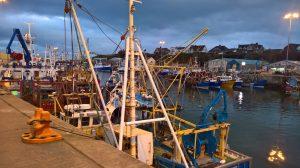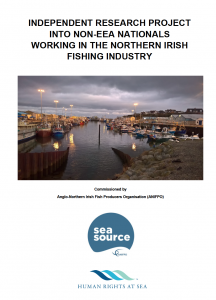OP-ED
19th March 2019
London. UK. Alan McCulla OBE Chief Executive of the Anglo-North Irish Fish Producers Organisation/Sea Source and Chair of the Fishermen’s Welfare Alliance speaks about his background and upbringing into the Northern Irish fishing community, his drive for better working conditions and business transparency in the fishing industry, and his organisation’s relationship with Human Rights at Sea over the past three years.
“People sometimes ask how long I’ve been involved in the fishing industry. My answer is 51 years – since birth. My father was a fisherman. It was the industry that brought me up and for the last 27 years I have been employed by fishermen in Northern Ireland.
Killai is a village in south-east India, a fishing community that was devastated by the Indian Ocean Tsunami of 26th December 2004. In the aftermath and like so many fishing communities world wide, Kilkeel, Ardglass and Portavogie in Northern Ireland embarked upon a series of events to raise money, this time to help rebuild Killai. As a result, in May 2007 I found myself in Killai.
It was a Sunday and after meeting the locals I was invited for Sunday lunch to the home of the one local who could speak English. His was an unusual house. It was the only one in the village built of concrete blocks. His young family could speak some words of English. On both counts I asked why?
He told me that the next morning he would be flying to Singapore to work on a building site there for the next 12 months. His salary would be sent to Killai to build the family home and educate his son and daughter, to provide them with a better start in life.
As it happened, it was in 2006/07 the fishing industry in Northern Ireland began to recruit crew from non-EEA countries, specifically the Philippines. A combination of factors had led to a severe shortage of local recruits willing to pursue a career on fishing vessels and a skilled workforce from a nation with a long maritime history offered a solution.

So, for the past 10 plus years a pipeline of fishing crew have been recruited from the Philippines, Ghana, Sri Lanka, Indonesia and other nations to work as engineers and deck hands on board our trawlers.
Back in 2007 I did ask myself if morally this was right thing to do? My story from Killai provided some vindication. Nevertheless, as we struggled to resolve what was, and in many ways continues to be a ‘grey area’ around the immigration rules for migrant seafarers and fishermen in particular, something was missing.
The fishing industry, including our organisation, spends a significant amount of resources working with various accreditation bodies to underline the sustainable nature of our fisheries. Without wild caught fish and shellfish our industry would simply not exist. It is in the fishing industry’s interest more than anyone else’s to ensure we have healthy and sustainable fish stocks for future generations, which can support fishing communities be they in Killai, the Philippines or Kilkeel.
Yet, an irony has been there is less emphasis on the welfare of our fishing crews, less focus on the humans who are engaged in harvesting sustainable fish stocks. Be it with domestic fishermen or those from overseas this was something that as an organisation we wished to change.
Modern Slavery Legislation, ILO regulations and consumer pressures are all combining to refocus our attention on crew welfare. This is something we support. If my own father had been posted somewhere else in the world to earn a living for his family I would have hoped that his health and wellbeing would have been top of the agenda for his employers. Likewise, when fishing crew are posted from other parts of the world to work with our member vessels I want them and their families to know we have their interest uppermost in our minds.
In 2016, we were introduced to Human Rights at Sea (HRAS), a charity that was then still in its infancy. Our dialogue with HRAS provided the incentive for us to develop policies to assist our members comply with Modern Slavery Legislation. HRAS also provided the opportunity to commission an independent audit of the processes we had in place to ensure they complied with the highest international crew welfare standards and identify any shortcomings in these processes that working with our owners we could rectify.

HRAS delivered their first assessment of our work in 2017, which we were pleased to have published . A second report was provided in 2018. A third review of our processes has just been commissioned.
In general, these reports have provided us with a clean bill of health. Nevertheless, there is room for improvement and thanks to our work with HRAS issues have been identified and resolved.
We cannot be complacent. We have domestic and international crew to protect, as well as our reputation for supplying world class sustainable seafood. From the outset we have not been obliged by our customers to commission this work – it was simply the right thing to do.
In 2019 it is encouraging to see others adopt this approach. It is essential these processes remain independent and transparent. Human Rights at Sea have provided this safeguard for us.
Be it for local fishermen or crew from overseas, it is our sincere hope the legacy being built as a result of the pioneering work between HRAS and ANIFPO/Sea Source will have positive and far reaching consequences.”
Ends.
COMING
ANIFPO will be publishing the results of their 2018 and 2019 Business and Human Rights audits undertaken by Human Rights at Sea International Ltd (HRASi), the not-for-profit consultancy for the charity.
